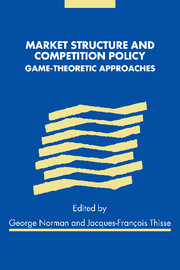Book contents
- Frontmatter
- Contents
- List of figures
- List of tables
- List of contributors
- Louis Phlips: a brief biography
- Introduction
- 1 Competition policy and game-theory: reflections based on the cement industry case
- 2 Legal standards and economic analysis of collusion in EC competition policy
- 3 A guided tour of the Folk Theorem
- 4 Predatory pricing and anti-dumping
- 5 Should pricing policies be regulated when firms may tacitly collude?
- 6 Tougher price competition or lower concentration: a trade-off for anti-trust authorities?
- 7 The strategic effects of supply guarantees: the raincheck game
- 8 Product market competition policy and technological performance
- 9 On some issues in the theory of competition in regulated markets
- 10 Modelling the entry and exit process in dynamic competition: an introduction to repeated-commitment models
- 11 Coordination failures in the Cournot approach to deregulated bank competition
- 12 How the adoption of a new technology is affected by the interaction between labour and product markets
- Index
1 - Competition policy and game-theory: reflections based on the cement industry case
Published online by Cambridge University Press: 22 September 2009
- Frontmatter
- Contents
- List of figures
- List of tables
- List of contributors
- Louis Phlips: a brief biography
- Introduction
- 1 Competition policy and game-theory: reflections based on the cement industry case
- 2 Legal standards and economic analysis of collusion in EC competition policy
- 3 A guided tour of the Folk Theorem
- 4 Predatory pricing and anti-dumping
- 5 Should pricing policies be regulated when firms may tacitly collude?
- 6 Tougher price competition or lower concentration: a trade-off for anti-trust authorities?
- 7 The strategic effects of supply guarantees: the raincheck game
- 8 Product market competition policy and technological performance
- 9 On some issues in the theory of competition in regulated markets
- 10 Modelling the entry and exit process in dynamic competition: an introduction to repeated-commitment models
- 11 Coordination failures in the Cournot approach to deregulated bank competition
- 12 How the adoption of a new technology is affected by the interaction between labour and product markets
- Index
Summary
Introduction
Is the main objective of competition policy the maintenance of competition per se or the promotion of economic efficiency? These two goals do not necessarily have the same basis or the same implications. The goal of maintaining competition per se can be justified morally, politically and legally by the wish to protect individual freedom and rights, and by limiting the power of agents. This faith in the democratic virtues of interacting competitive forces is grounded in a political philosophy which sees regulatory mechanisms resulting from impersonal market forces as a guarantee against the arbitrariness of authority, whether public or private. In this sense, competition is a right which warrants protection. Economically, competition is not considered as an end in itself but rather as a mechanism for allocating resources which in many, if not all cases, promotes economic efficiency. The question the economist has then to answer is whether or not, depending on the circumstances, competition promotes the reduction of costs, the selection of the most efficient businesses, the welfare of consumers, the creation of new products, the entry of new enterprises, the development of technological progress and innovation and so on.
To what extent do these two goals of competition policy overlap? Before setting out our framework to formulate an answer to this question, let us introduce the basic issues.
- Type
- Chapter
- Information
- Market Structure and Competition PolicyGame-Theoretic Approaches, pp. 9 - 30Publisher: Cambridge University PressPrint publication year: 2000
- 6
- Cited by



